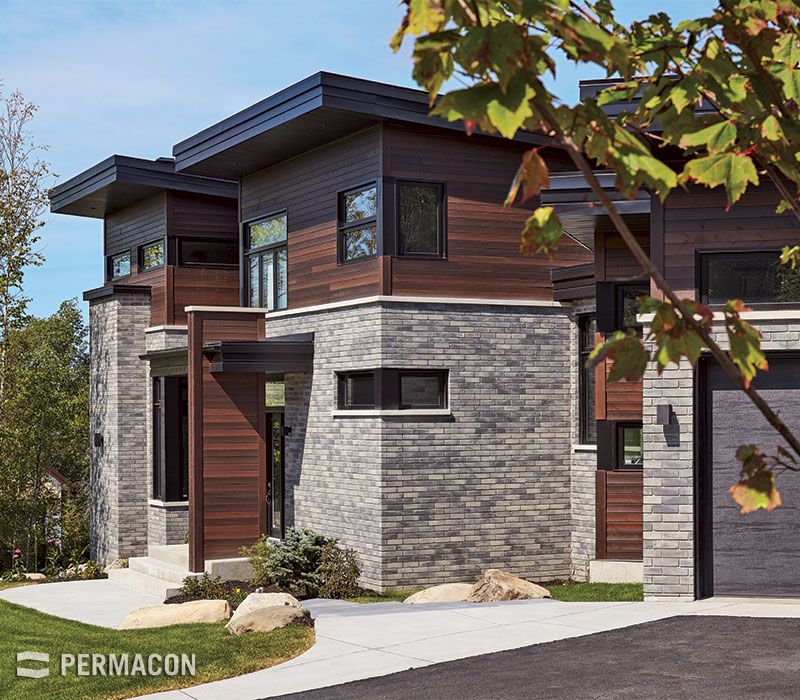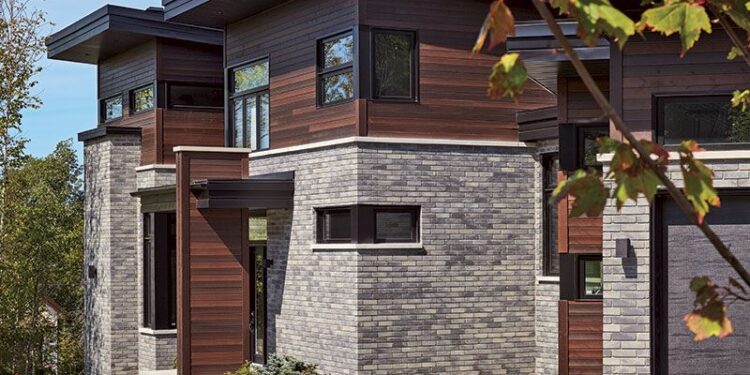Siding on a brick house opens up a world of possibilities, blending traditional charm with modern functionality. From classic to contemporary, the choices are diverse and exciting, offering homeowners a chance to enhance their property's curb appeal in unique ways.
Let's delve into the realm of siding on brick houses and uncover the best options and practices for a stunning exterior transformation.
Types of Siding for Brick Houses
When it comes to siding options for brick houses, there are several materials to choose from. Each type of siding has its own unique characteristics and benefits that can enhance the overall look and functionality of your home.
Vinyl Siding
Vinyl siding is a popular choice for brick houses due to its affordability, low maintenance, and versatility. It comes in a wide range of colors and styles, making it easy to customize the look of your home. Additionally, vinyl siding is durable and resistant to rot, mold, and insects.
Fiber Cement Siding
Fiber cement siding is another great option for brick houses. This type of siding is known for its durability, fire resistance, and ability to mimic the look of wood or stucco. Fiber cement siding is also low maintenance and can withstand harsh weather conditions.
Wood Siding
Wood siding can add a natural and rustic charm to a brick house. Cedar and redwood are popular choices for wood siding due to their natural resistance to rot and insects. However, wood siding requires regular maintenance, such as painting or staining, to prevent weathering and damage.
Brick Veneer Siding
If you want to maintain the classic look of brick on your home but still add some variety, brick veneer siding is a great option. Brick veneer siding is made from thin slices of real brick that are attached to a different material, such as fiber cement or metal.
This type of siding provides the appearance of full bricks without the weight and cost.
Stone Veneer Siding
Stone veneer siding is a luxurious option for brick houses that want to achieve a sophisticated and elegant look. This type of siding is made from thin slices of natural stone that are attached to a backing material. Stone veneer siding can add texture and visual interest to the exterior of your home.
Installation Process
Installing siding on a brick house can be a challenging task that requires careful planning and execution. Here are the general steps involved in the installation process, along with some special considerations and tips for ensuring a seamless and durable siding installation on a brick exterior.
Preparation
Before starting the installation process, it is crucial to prepare the brick surface properly. This includes cleaning the brick thoroughly to remove any dirt, debris, or mold that could affect the adhesion of the siding. Additionally, any damaged or deteriorating bricks should be repaired or replaced before installing the siding.
Choosing the Right Siding
When selecting siding for a brick house, it is important to choose a material that complements the existing brickwork and provides the desired aesthetic appeal. Vinyl, fiber cement, and wood siding are popular choices for brick houses, as they offer durability and versatility.
Installation Steps
- Measure and cut the siding panels to fit the dimensions of the exterior walls.
- Install a moisture barrier or insulation layer between the siding and the brick to prevent moisture buildup.
- Attach the siding panels to the brick using the appropriate fasteners, taking care to leave room for expansion and contraction.
- Seal the seams and joints of the siding to prevent water infiltration and ensure a weather-tight installation.
- Finish the installation by adding trim pieces and other decorative elements to enhance the overall look of the siding.
Special Considerations
- When installing siding on brick, it is important to use masonry anchors or screws designed specifically for brick walls to ensure a secure attachment.
- Take into account the weight of the siding material when installing on brick, as it may require additional support or reinforcement.
- Consider the impact of the siding installation on the overall ventilation and moisture management of the brick structure.
Tips for a Seamless Installation
- Hire a professional contractor with experience in installing siding on brick houses to ensure a high-quality installation.
- Regularly inspect the siding for any signs of damage or wear and tear, and address any issues promptly to prevent further damage to the brick exterior.
- Follow the manufacturer's guidelines and recommendations for installation to ensure the longevity and performance of the siding material.
Maintenance and Care
Maintaining the siding on a brick house is essential to preserve its appearance and functionality over time. Proper care can help prevent damage and prolong the lifespan of the siding materials.Regular cleaning is crucial to keep the siding on a brick house looking its best.
Different siding materials may require specific cleaning methods to avoid causing damage. Here are some tips on how to clean and upkeep various siding materials on a brick exterior:
Cleaning and Upkeep Tips
- For vinyl siding, use a mixture of water and mild detergent to gently scrub away dirt and grime. Avoid using harsh chemicals or abrasive tools that could scratch the surface.
- Wood siding should be inspected regularly for signs of rot or mold. Clean with a solution of water and bleach to remove mold, and consider applying a fresh coat of paint or sealant to protect the wood.
- Fiber cement siding can be cleaned with a hose or pressure washer to remove dirt and debris. Be cautious with the pressure setting to avoid damaging the siding.
- Brick siding itself may also require occasional cleaning to remove dirt and stains. A mixture of water and vinegar can be effective for spot cleaning on brick surfaces.
Common Issues and Solutions
- Mold or mildew growth: Keep siding surfaces clean and dry to prevent the growth of mold or mildew. Address any signs of mold promptly with appropriate cleaning solutions.
- Cracks or gaps: Inspect the siding regularly for cracks or gaps that could allow moisture to seep in. Seal any openings with caulk or replace damaged siding panels to maintain the integrity of the exterior.
- Fading or discoloration: Exposure to sunlight and weather elements can cause siding to fade or change color over time. Consider repainting or replacing faded siding to maintain a uniform appearance.
Design and Aesthetics
When it comes to combining siding with a brick exterior, there are various design options to consider to enhance the overall look of your home. Color coordination, textures, and patterns all play a significant role in creating a visually appealing facade using siding on a brick house.
Color Coordination
One key aspect to consider when choosing siding for a brick house is color coordination. Opt for colors that complement the existing brick color rather than clash with it. Earthy tones like beige, cream, or gray often work well with a variety of brick shades.
Textures and Patterns
Adding texture and patterns can elevate the visual interest of your home's exterior. Consider mixing different siding materials with brick, such as vertical siding, shake siding, or board and batten siding. This can create depth and dimension to the facade.
Tips for a Visually Appealing Facade
- Choose a siding color that contrasts with the brick to make a statement.
- Use siding accents like trim and shutters to tie the look together.
- Consider the architectural style of your home when selecting siding designs.
- Experiment with different combinations of siding materials to find the perfect match for your brick exterior.
Conclusion

In conclusion, siding on a brick house presents a canvas for creativity and practicality. By understanding the various types of siding, installation processes, maintenance requirements, and design possibilities, homeowners can elevate their brick exteriors to new heights of elegance and durability.
Embrace the fusion of tradition and innovation with siding on your brick house today.
FAQ Guide
What are the best siding options for a brick house?
Vinyl, fiber cement, and wood are popular choices for siding on brick houses due to their durability and aesthetic appeal.
How do I maintain siding on a brick house?
Regular cleaning and inspection are key. Use mild detergent and water to clean siding and address any issues promptly.
Can I change the color of siding on a brick house?
Yes, some siding materials allow for painting or can be purchased in different colors to complement your brick exterior.


